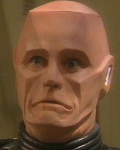|
FullLeatherJacket posted:I would suggest that there's a difference between complaining that something isn't internally consistent or that it fails to accomplish what it sets out to achieve, and standing up and saying, "well, if space wizards did exist, they certainly wouldn't wear that". You can allow for the fact that James Bond never files any paperwork while still thinking it's absurd for him to sneak up on a bad guy by hiding behind an invisible car. Q: How do you kill a vampire? A: However you'd like, vampires do not exist. Reapers do not exist. Turians do not exist. Earth as shown in this game does not exist. A giant metal spaceborne sea creature can kill Earth as fast or as slow as it likes because there is no referent to that so gently caress canonicity. ME3 canon is made up as it goes along and thank god for it. Womens bodies exist. Miranda is literally modeled after Yvonne Strahovski. Bioware consciously took things that exist IRL and showed them certain, selective ways which can be read certain ways. Saying that's "posturing" instead of "how adults talk about media" displays a set of priorities that is really weird. The intersections with its contemporary world is literally where fiction derives its meaning and relevance unless one derives utmost gratification curating a wiki of Mass Effect trivia, which is again: weird. e; i did it i made the only post on the internet to use literally correctly in a sentence not once but twice.
|
|
|
|

|
| # ? May 23, 2024 04:16 |
|
But... my immersion !!
|
|
|
|
Willie Tomg posted:Saying that's "posturing" instead of "how adults talk about media" displays a set of priorities that is really weird. The intersections with its contemporary world is literally where fiction derives its meaning and relevance unless one derives utmost gratification curating a wiki of Mass Effect trivia, which is again: weird.
|
|
|
|
Mr. Soop posted:This is true. The looks fit the characterization. Miranda was created by her father with "genetic perfection" in mind both physically and mentally, so it makes sense that she would ooze sexuality while being the brains of the group. It's right out of a Michael Bay movie, but it more or less works. Same with Jack. She's a gal who flaunts her sexuality in a way that makes her feel powerful, and the backstory and romance go into why that is. Again, not the best writing but it gives a reason for it. I'm another one who preferred femShep's looks in one and two over three. She just looked more like someone on active duty in the millitary (little to no makeup, functional haircut and style, athletic build, etc). I agree that they should have used a woman with a more athletic/combat build, and I really wish they'd actually used a woman for her mo-cap. With regards to her increased bust size in 2 and 3, beleive it or not this is actually a point she can make near the begining of 2, while talking to one of the Cerberus folks (don't remember which, but you can say something along the lines of "I noticed you made some... 'upgrades' while I was out. Is there anything else I should know about?"). Terrible, terrible pandering. On the subject of games that actually treat women fairly well (or at least fairly) I would actual have to argue that the Saints Row games do a pretty good job of it, at least with plot characters anyway.
|
|
|
|
Sombrerotron posted:It could be that I'm misreading FLJ's post (or yours), but I think the posturing he's referring to concerns character design being disconnected from the character's traits/thematical importance, presumably for the sole purpose of being "interesting" and/or appealing to certain audiences, rather than the critical discussion of character design (or space ships, I suppose). He's said that character design should inform characterization and be consistent throughout and that any commentary beyond that is irrelevant. My response is that's really silly and arbitrary and someone minded to respect their own intelligence can do better. I wouldn't even read actual holy writ like The Bible or the Vedas that way, I'm certainly not going to treat the universe of Mass Effect as sacrosanct as long as its consistent. Here's a thing I find kinda speaks to the whole "its just a fantasy" thing. A fantasy constructed by a team of hundreds of people working for most of their waking hours for the better part of two years to finish a wildly anticipated story, but its fantasy and just fantasy, fantasy fantasy fantasy, therefore contains no commentary on the outside world. It's an excerpt from an investigative piece about turn of the century youth marketing which is applicable because it directly addresses the demographic presumably being pandered to by pg13 T&A and also the construction of realities. Even the fantastic ones with no meaning to them whatsoever. quote:Since then, I think the relationship between authentic youth cultural happenings and youth culture consumption is indistinguishable. I think that kids who are on "The Real World" are kids who've aspired to be on MTV their whole lives. They've learned how to behave by watching MTV. So that now when MTV takes a bunch of them and puts them in a house and puts a camera on them, they're not putting a camera in the real world. They are photographing people who've been programmed how to behave by MTV. So where is the reality in the equation? The reality is the introduction of media into this equation. The reality is the media. So that we end up reaching an abstracted form of authenticity that is authentic for the very fact that it's mediated consumptive marketing pulp. The reality itself, the tapestry of reality is composed of media iconography. That is the new plane of reality for these people. Thus empowered, bioware and EA did this, and EDI sexbot etc etc. A company thinking that of your tastes should, ideally, not thrill you.
|
|
|
|
Willie Tomg posted:
I had not quite thought of it that way before. That's a rather chilling thought.
|
|
|
|
Willie Tomg posted:Q: How do you kill a vampire? This seems to miss the point of fiction and media almost entirely. No, of course there's no "definitive" way to kill a vampire, because yes, of course, vampires don't exist. But even if between works the way to kill a vampire can differ (say... Twilight versus Dracula versus Van Hellsing), within the universes themselves it is important that the way to kill a vampire stays consistent. They can't be weak to sunlight one minute and immune to it the next (without proper in-universe justification). Nobody is going to get invested in your work if the rules are constantly in flux and the plot makes no sense, and as a for-profit fiction writer, that is probably your goal above all else, to get a loyal, invested consumer base so that you may continue to write for a living. It is important to the writer, therefore, that their story "matches up" with itself. As much as the "my immersion!" thing has reached memetic status, people still like to be immersed in their stories. What doesn't actually matter, comparatively, is reality. Vampires don't exist. If reality was of paramount importance to a book or other work of fiction, then nobody would give a crap about vampire books or movies, because vampires don't exist. They'd just throw their hands up and go "pfft!" People, as consumers of media, are willing to temporarily disengage with reality in order to enjoy a work on its own terms. In fact, they're pretty eager to do it. Works of fiction are designed to be escapist fantasism. They're pretty much required to not represent reality accurately. If you wanted a book representing the real world in excruciating detail, you'd read non-fiction. Most adults are capable of knowing where the line between fiction and non-fiction, between fantasy and reality, lies. To suggest otherwise is to echo the points of Jack Thompson, who posited that violence in videogames turns people towards violence in real life; suggesting that depictions of people in media, be they burly space marines or supermodel asskickers, would colour perceptions of people in reality is to reiterate the same point with a different veneer - that fantasy can affect reality. Why, then, was Thompson's crusade laughed out of the (court)room, and yet this one seems to have such staying power? Either people are responsible enough to seperate fantasy and reality, or they aren't. And it may be that they aren't, in which case it becomes an exercise in Drawing The Line. Do we frown on vampires in books because people might take that as saying that vampires exist? Do we frown on violence in films because that might make people more inclined to consider violence acceptable? Do we disallow fantastic elements entirely, or ones that might reflect on things that exist in reality, for fear of negative assosciative effects? I'd argue that that's all just distraction. If people can't see where fantasy ends and reality begins, that's what we should work on. Rather than try to work out at what point a work of fiction becomes too dangerous to the consumers because of its influence over their actions, work on breaking its influence over them. Controlling artistic direction should never be the solution to any problem, that would be a crying shame.
|
|
|
|
Willie Tomg posted:Q: How do you kill a vampire? This is where the concept of internal consistency comes into play. Spiderman can climb walls and Harry Potter can fly on a broomstick. If Harry Potter suddenly starts climbing the walls, you've hosed up somewhere, even if both characters are entirely fictional. quote:Womens bodies exist. Miranda is literally modeled after Yvonne Strahovski. Bioware consciously took things that exist IRL and showed them certain, selective ways which can be read certain ways. If we're going to discuss the meaning and relevance of the Mass Effect series, I think we can safely say that it's found just about anywhere except Miranda's backside. It's not that it's not worthy of discussion, but it becomes posturing to frame it as being an issue of "realism" instead of an excuse to get rid of things that they don't necessarily like politically. I'm not going to cheerlead for Bioware and a lot of their approach to character interaction, but it seems a particularly joyless and puritanical approach to demand that every character in the game be strapped into gundam suits lest someone in the audience be titillated in a culturally unhelpful way, and I don't see that Bioware are under an obligation to write characters for their games on that basis. You're writing a game that's supposed to be something that people play for fun so they can vicariously be a secret agent flying around space and solving mysteries. Of course that's going to involve a certain level of making a product that the audience will actually enjoy and want to buy, instead of just remaking The World At War but with spaceships.
|
|
|
|
I feel I need to point out that added into this whole mess your subconscious can't tell the difference between a simulation and reality. Give someone a fake virtual reward that does absolutely nothing (like say an achievement, or a hat) and exactly the same parts of the brain light up as if you had given them a real physical reward; its all the same to your brain. Think about that for awhile, then think about video games and how they depict women, then think about the fact that despite your rational acknowledgement that what you are seeing on the screen is a fiction the same parts of your brain are lighting up as if it were real. Yeah that's right, at a very basic level your instincts can't tell the difference between Miranda and a real human woman. Think about what that actually means for a second. Scary huh?
|
|
|
|
It means I want to gently caress Miranda?
|
|
|
|
Neruz posted:I feel I need to point out that added into this whole mess your subconscious can't tell the difference between a simulation and reality. Give someone a fake virtual reward that does absolutely nothing (like say an achievement, or a hat) and exactly the same parts of the brain light up as if you had given them a real physical reward; its all the same to your brain. You know that would be scary... if I handled a real twit any differently than I do an imaginary one.
|
|
|
|
FullLeatherJacket posted:This is where the concept of internal consistency comes into play. Spiderman can climb walls and Harry Potter can fly on a broomstick. If Harry Potter suddenly starts climbing the walls, you've hosed up somewhere, even if both characters are entirely fictional. I don't particularly care about realism, or good taste or political anything for the sake of this discussion, I'm trying to keep this particularly derail-prone topic trained on a practical aesthetic storytelling argument. The universe of Mass Effect is unrealistic and melodramatic as hell and that owns. The entire series the Reapers have been kept vague, their threat level the precise level of Plot. Of course they're going to fulfill that same role in the final game. Their entire purpose narratively and mechanically is to give you a sense of urgency wherever you're going, whatever you're doing. Of course they're going to be inconsistent in what they do and what they're doing in different places, they have absolutely no established set of power or anything. That's trying to put a number on Bioware attempting to communicate a mood of "WE'RE hosed! FUUUUUUUCCKKKKKED!!" The story is the important part, and communicating the mood of that greatest part of that and the level design will reflect that and gently caress good sense and realism it doesn't matter. Bioware also sexed up the models because that's what they're trying to convey. The dudes will be all clad and poo poo because most of the people playing this are straight dudes Miranda's sexy because she's Literally Perfect in the story. Jack's sexy because she doesn't give a gently caress enough to wear a shirt. Tali's sexy because she's legal now plus Quarian spandex plus a seriously unfortunate online fandom. Morinth and by extension Samara because in the story Morinth needs to look like a seductress parasite so the exotic Justicar has to be sexy or else the whole disguise thing won't work (lol at the idea of Morinth dressing up just because her life is on the line) but holy god don't try it with either. This is also the story and mood and characterization they wanted to convey. They'll do this because gently caress good sense and realism it doesn't matter. They'll have big rear end titties because that's the story, gently caress it it doesn't matter. You just take it in and whatever, it's a made up universe. Paper thin armor, bikini armor whatever, its a story, keep going or leave. That's why the distress over the exact count of Reapers and the destruction level of Palaven or whatever trivial nuance of level design while appropriately categorizing the female character design is so funny to someone trying to actually pick apart the ideas of the story and treating the story like a story written by hundreds of writers, designers, modelers, texture artists, etc. In ME3 EDI becomes a physical generic female character of the Mass Effect franchise. EDI doesn't change, she--in the story!--assumes the body of a generic female scientist cameo character whose holographic skin texture template shorted out. Turns out its a sex-bot. Bioware really wanted to tell this story with this character because they really stick with it. It's an open acknowledgement of where Bioware wants to take the series, and its not offensive or chauvanistic or harmful or anything like that, it's just a story. It's a story element that stems from the design just like the Reaper discrepancies. The word is tacky. Stories are tacky. The weird and dissonant design and story elements presage it, and the EDI sex-bot in ME3 is Bioware outing Mass Effect as really, really tacky. quote:I'm not going to cheerlead for Bioware and a lot of their approach to character interaction, but it seems a particularly joyless and puritanical approach to demand that every character in the game be strapped into gundam suits lest someone in the audience be titillated in a culturally unhelpful way, and I don't see that Bioware are under an obligation to write characters for their games on that basis. Agreed 100%. quote:You're writing a game that's supposed to be something that people play for fun so they can vicariously be a secret agent flying around space and solving mysteries. People keep talking about everyone of sound mental health keeping straight the distinction between simulation and reality therefore don't deconstruct stories for some reason, and then using words like "immersion" and writing sentences like this and that's interesting. Willie Tomg fucked around with this message at 14:02 on Aug 4, 2014 |
|
|
|
Oh my god because of this conversation I now kind of like EDI for being just retarded enough for ME3's story, I'm not even kidding. She's just awful enough to bring the whole thing together with raw camp value. Like the prequel trilogy, I now unironically appreciate ME3 and its role in ending the Mass Effect trilogy for how complex and intersecting its stupidity is. Thank you, LtDanger. You didn't help me unsee the mess, you helped me see it all. I will never forget this for as long as I'm awake. 
|
|
|
|
What you are saying about these sexy people makes sense. But please explain why the Dalatrass is cum city?
|
|
|
|
Mr. Soop posted:This is true. The looks fit the characterization. Miranda was created by her father with "genetic perfection" in mind both physically and mentally, so it makes sense that she would ooze sexuality while being the brains of the group. It's right out of a Michael Bay movie, but it more or less works
|
|
|
|
Speaking of stupidity, here's what Gabby and Kenneth (two Cerberus engineers from ME2 who you can recruit for the Normandy) have to say about EDI's new body in an optional conversation.”Mass Effect 3” posted:
Bioware's writers decided that the most interesting characteristics of an Artificial Intelligence created by terrorist to control a super stealth space warship were her feminine voice and vague affection for Joker. Those are the things that they wanted to build upon for the third game. EDI's connections to Mass Effect's overarching themes are entirely ancillary to her primary function of enabling fanfiction and being a sexbot. That's why pandering, especially of the sexual variety, is so disappointing to see in media. Bioware's prioritization of titillation greatly limits the types of characters they can make. Setherrock fucked around with this message at 06:45 on Aug 4, 2014 |
|
|
|
Not really related to the current discussion, but Jack's tattoo's actually have some pretty neat details-  she has the 'failed' concept versions of herself as tattoos edit: Actually I suppose that line at the bottom of the second picture is somewhat relevant quote:Once it was decided that Jack would be clothed in tattoos, various directions were explored for how to tell her backstory through them. We also sought ways to best show off her tattoos while covering her chest to some degree. Concerns about how exposed she was led to some of these changes. I don't really have much to add myself though. Mazerunner fucked around with this message at 05:06 on Aug 4, 2014 |
|
|
|
FullLeatherJacket posted:I'm not going to cheerlead for Bioware and a lot of their approach to character interaction, but it seems a particularly joyless and puritanical approach to demand that every character in the game be strapped into gundam suits lest someone in the audience be titillated in a culturally unhelpful way, and I don't see that Bioware are under an obligation to write characters for their games on that basis. FullLeatherJacket posted:You're writing a game that's supposed to be something that people play for fun so they can vicariously be a secret agent flying around space and solving mysteries. Of course that's going to involve a certain level of making a product that the audience will actually enjoy and want to buy, instead of just remaking The World At War but with spaceships. Like, you have said that consistency is important. How is it consistent to have a universe where Shepherd, Garrus, etc. all put on thick armored suits with helmets when they go EVA in hard vacuum, and Miranda just keeps her regular clothes on and maybe adds a tiny transparent mask over her mouth? Her character is supposed to be "perfect human", not "superhuman". Sometimes, when someone says "realism" they actually do mean consistency, not that they're part of a bizarro-feminist conspiracy to spoil your fun.
|
|
|
|
Setherrock posted:Bioware's writers decided that the most interesting characteristics of an Artificial Intelligence created by terrorist to control a super stealth space warship were her feminine voice and vague affection for Joker. Those are the things that they wanted to build upon for the third game. EDI's connections to Mass Effect's overarching themes are entirely ancillary to her primary function of enabling fanfiction and being a sexbot.
|
|
|
|
Setherrock posted:Speaking of stupidity, here's what Gabby and Kenneth (two Cerberus engineers from ME2 who you can recruit for the Normandy) have to say about EDI's new body in an optional conversation. You do realise that's Kenneth's entire schtick, don't you? http://www.imdb.com/character/ch0269796/quotes
|
|
|
|
Changing the subject; it's actually interesting to see how differently things play out with Wreav as opposed to Wrex. Wrex handles things having strong loyalty to the Krogan but being fully aware of their history and mistakes, and as such tries to communicate how different the Krogan are under him and how they need the genophage cured to move forward as a society. Wreav just wants the 'phage gone and is loving angry it was ever a thing because the Krogan are the best ever and should be in power.
|
|
|
|
I feel like I would like Wreav more if you didn't need to be a horrible person and let Wrex die in order for him to show up, but to me if I have to choose between Wreav or Wrex it is a no brainer to pick Wrex because I consider him a far superior character.
|
|
|
|
There's one pretty important mechanical "advantage" Wreav has over Wrex that I'm pretty sure we're going to see in the LP when the time comes.
|
|
|
|
I think it's worth mentioning that nobody having any idea what to do or even really what's going on gives a kind of fever dream quality to the game. I experienced it as a series of barely-connected setpieces held together by a scientist who would literally tell you the percentage of the game (crucible) you had completed, before heading into the deus-ex-machina ending. The Mars mission followed by Palaven is a great example of this weird disjointed quality to the game. You have to go pick up Liara; there's no other reason to go to Mars. Conveniently she's being attacked by people who are trying to erase all knowledge of the Reapers' one weakness. But then Shepard proceeds to ping-pong off to his original mission with the data in tow. That data will become the centerpiece of the story and also be almost entirely off-camera for the rest of the game while Shepard runs around accomplishing... what exactly? He has to defend the council for some reason and the Citadel gets attacked, but even when he loses in unchangeable cutscenes those results don't seem to matter. The Crucible number goes up, and when it's at 100% you unlock the ending. I agree with WillieTOMG, the game (on the narrative level) is just a hot mess. I also agree that this game's narrative difficulties stem in large part from Mass Effect 2 comprehensively refusing to carry any water setting up ME3. The damp-squib introduction of the Reapers is an almost unavoidable consequence of the need to jump-start the Reaper story again after 20 hours of neglect. After all they couldn't simply have ME3 be about preventing the Reapers' return again -- that was ME1 -- nor did they have the time for them to arrive and then be defeated, so the only option is for them to show up without a proper introduction. The Crucible may be an ugly and obvious storytelling crutch, but something like that is a necessary consequence of the Reapers arriving with no setup, unless you want to deflate their menace by letting them succumb to a conventional military defeat. Finally, I think we should avoid conflating criticism in the general sense with film criticism specifically. Lt. Danger brought up the film criticism axiom that one must engage the work as it is rather than the work as you think it should be. Film criticism (especially to those interested in symbolism) tends to be about analyzing the thematic elements of film though, not criticism in the broader sense. Frankly I don't think much of that axiom in the first place, and in the case of Mass Effect 3 which had well-known writing and production difficulties it seems more like a tactic to shut down criticism than a guide to enable it.
|
|
|
|
Arglebargle III posted:I also agree that this game's narrative difficulties stem in large part from Mass Effect 2 comprehensively refusing to carry any water setting up ME3. The damp-squib introduction of the Reapers is an almost unavoidable consequence of the need to jump-start the Reaper story again after 20 hours of neglect. After all they couldn't simply have ME3 be about preventing the Reapers' return again -- that was ME1 -- nor did they have the time for them to arrive and then be defeated, so the only option is for them to show up without a proper introduction. The Crucible may be an ugly and obvious storytelling crutch, but something like that is a necessary consequence of the Reapers arriving with no setup, unless you want to deflate their menace by letting them succumb to a conventional military defeat. I disagree. When you analyse a work based on your preconceived notions of how it should be, you end up with incorrect and/or meaningless analysis. For example, because you think ME2 should have been about the Reapers, you think that's responsible for the weak beginning. I'd suggest something a lot simpler: the weak beginning is due to vague writing and messy visual direction, and improves as the prologue moves on to the superior Mars and Menae areas - and the reason Earth is poorly written because of the extensive rewrite from the originally-planned trial scene, which probably wasn't fully polished in time for release. For that matter, you miss out on the clue that if the Reapers can be relegated to a background element for an entire game, then maybe they aren't all that important in the way you think they are. Another example of this phenomenon would be Waltzing Along/Geostomp/BioMe earlier in the thread, who all damned Menae for 'bad writing' in placing Earth above all else, even in the eyes of aliens, when in fact that never occurred at all and they'd projected the entire thing. 'Criticism in general', i.e. fan-theorising, superficial description and high-school-level lit analysis, says very little about the text being analysed and far too much about what individuals think and feel. I could probably write many essays on all the ways I'd do Mass Effect 3 differently, and use lots of proper jargon in them to boot, but this isn't Let's Play Lt. Danger's Masturbatory Fantasies just yet.
|
|
|
|
I think you are responding to the right part of my post, because this is where we disagree. I think we are talking about two different things. The analysis you are talking about seems to be primarily interested in finding out what Mass Effect 3 is about.* The criticism you say is masturbatory is interested in dissecting why Mass Effect 3 (and to a lesser extent 2) were disappointing from a player's perspective compared to Mass Effect 1. I think you do a disservice to both by conflating the two endeavors. It is correct to say that understanding the meaning of something can't be accomplished by talking about what you wish had happened. It is however wrong to apply that same rule to the endeavor of discovering why it was disappointing. They are simply two different types of question. When you tell someone flatly that they've got the wrong answers, as you did earlier in the thread, without recognizing that they're considering a different question, you just create animosity and further muddle both conversations. Lt. Danger posted:the reason Earth is poorly written because of the extensive rewrite from the originally-planned trial scene, which probably wasn't fully polished in time for release. Isn't even this extra-textual knowledge disallowed by your own maxim though? If random people aren't allowed to chime in with how they thought it should have been done, why are the authors' own ideas on how they might have done it better allowable? I understand that analysis becomes much cleaner and easier when "critics" don't allow hypotheticals into the discussion (except when they do, see above) but I think it tends to lead to bad analysis. Specifically, I think it tends to lead people into being too generous. When we can only judge something on its own terms, we tend to lose the ability to measure anything and end up with platitudinous statements about how -INSERT TITLE- succeeds in being what it is. The type of analysis you're doing really defies value judgements. If you're asking what Mass Effect 3 was about, what it meant, the answer doesn't really have a value component. Which is why whenever people try to tack them on to this sort of discourse it ends up being wishy-washy and meaningless. *In the context of postmodern death of the author I consider this type of analysis to be the more masturbatory of the two intellectual exercises. Asking why Mass Effect 3 was unfulfilling to play can at least have some bearing on both the making and appreciation of video games. Treating it as if it was all a bunch of nerds saying "I would have done X" is just strawmanning, there are plenty of people willing to dial down and look at faults in the crafstmanship on a writers' level. In contrast, asking what Mass Effect 3 meant when you know full well that the ending was thought up at the last minute by two people in a locked room AND that your analysis is only valid for your personal experience seems... well, like intellectual masturbation.
|
|
|
|
Lt. Danger posted:For example, because you think ME2 should have been about the Reapers, you think that's responsible for the weak beginning. I'd suggest something a lot simpler: the weak beginning is due to vague writing and messy visual direction, and improves as the prologue moves on to the superior Mars and Menae areas - and the reason Earth is poorly written because of the extensive rewrite from the originally-planned trial scene, which probably wasn't fully polished in time for release. I think the Reapers' introduction in ME3 is placed under severe limitations by ME2's lack of setup and by narrative necessity in ME3. They have very little wiggle room to introduce the Reapers in an already demanding opening act. Could they have done a better job of introducing them? Sure, but they had time and narrative necessities working against them. They could hardly introduce the Reapers in the middle of the story, and you pointed the reason the trial had to be jettisoned in the first place was problematic pacing. So the writing and visual direction are a problem, sure. Good. Fine. The work can have issues that are endogenous rather than exogenous! But I don't see why you feel you have to deny the existence of exogenous constraints in the final act of a trilogy! quote:For that matter, you miss out on the clue that if the Reapers can be relegated to a background element for an entire game, then maybe they aren't all that important in the way you think they are. On the last bit, I'd take issue with the idea that we're now playing tricks with the idea of possibilities and hypotheticals. Can the Reapers be relegated to a background element? If we're not considering hypotheticals, how could they NOT be relegated to the background, because they were! The whole premise of the idea is flawed. Of course the Reapers CAN be relegated to the background for the entire game, just like Jack CAN not wear a shirt for the entire game or Kaidan CAN be the most boring party member in the series. SHOULD they be any of these things? It's impossible to even have that discussion if you continue to conflate the question of what Mass Effect 3 means and whether Mass Effect 3 was good or bad. Like I said, you end up with platitudinous statements like this one when you attempt to attach value judgements to value-neutral analysis. The Reapers were left out for a whole game, so the Reapers are a plot element that can be left out for a whole game. It's almost circular logic, and it would be if you were attempting to make a value statement about the story instead of analyzing the story on its own merits. So, to reiterate again, you really need to separate these two lines of questioning or things get muddled. Arglebargle III fucked around with this message at 20:09 on Aug 4, 2014 |
|
|
|
Arglebargle III posted:I think you do a disservice to both by conflating the two endeavors. It is correct to say that understanding the meaning of something can't be accomplished by talking about what you wish had happened. It is however wrong to apply that same rule to the endeavor of discovering why it was disappointing. They are simply two different types of question. That's a fair point. Any and every judgement I could ever make about ME3 will contain countless possibles and could-bes, even if just by omission. However it's not hypotheticals themselves that bother me; I'm more concerned about prescriptivist analysis leading people to ignore what's actually going on. People get Chekov's Gun and the three act plot lodged into the brains and parse everything through that lens, ultimately leading to the likes of that one person in the general ME3 thread who thought Bioware should have planned out the entire seven-year trilogy in detail from the very start. The end result is that we end up finding more about individual posters' narrative priorities than about ME3, and that's something I'd like to avoid. Really, the only thing I want is for posts to be interesting, and I will break every single one of my rules in the process of achieving that. quote:On the last bit, I'd take issue with the idea that we're now playing tricks with the idea of possibilities and hypotheticals. Can the Reapers be relegated to a background element? If we're not considering hypotheticals, how could they NOT be relegated to the background, because they were! The whole premise of the idea is flawed. Of course the Reapers CAN be relegated to the background for the entire game, just like Jack CAN not wear a shirt for the entire game or Kaidan CAN be the most boring party member in the series. SHOULD they be any of these things? It's impossible to even have that discussion if you continue to conflate the question of what Mass Effect 3 means and whether Mass Effect 3 was good or bad. Sorry, I wasn't clear there. I wasn't hypothesising - the Reapers aren't that important. This is important to understanding how ME3 works. What I'm hoping with this thread is that if people can let go of their prescriptivism, they can see what ME3 is actually doing and maybe enjoy or at least understand the story that it does, in fact, tell. If you spend the whole thread dismissing the writing as bad because the Reapers aren't as important as you think they should be, you miss out on figuring out what actually is important; by assuming that artistic choices are some kind of "mistake" or "writer error", you end up not finding out what those artistic choices mean.
|
|
|
|
Willie Tomg posted:I don't particularly care about realism, or good taste or political anything for the sake of this discussion, I'm trying to keep this particularly derail-prone topic trained on a practical aesthetic storytelling argument. The universe of Mass Effect is unrealistic and melodramatic as hell and that owns. The entire series the Reapers have been kept vague, their threat level the precise level of Plot. Of course they're going to fulfill that same role in the final game. Their entire purpose narratively and mechanically is to give you a sense of urgency wherever you're going, whatever you're doing. Of course they're going to be inconsistent in what they do and what they're doing in different places, they have absolutely no established set of power or anything. That's trying to put a number on Bioware attempting to communicate a mood of "WE'RE hosed! FUUUUUUUCCKKKKKED!!" The story is the important part, and communicating the mood of that greatest part of that and the level design will reflect that and gently caress good sense and realism it doesn't matter. This seems to be pushing toward the idea that a game (or any form of story) must pitch its tent in one of two camps, either "gritty realism" or "wacky hijinks". I'd suggest that almost all works of fiction meet somewhere in the middle, and it's why we talk about "artistic licence". I would tend to agree with you if a lot of the complaints earlier had been really petty things about the nature of ammo cooldown or why only tech characters can have invisibility cloaks, when surely that would be tech that a real army would roll out to everyone on the battlefield. The answer is "because it's a video game not a documentary, go outside". However, the main complaints that people seemed to have were about the narrative itself, and the fact that, for example, they can't decide if something that's visibly on fire (from space!) is hosed or not hosed. Soricidus posted:I agree! As does everybody in this thread, so far as I can see! But you're doing a great job beating the poo poo out of that argument you have a peculiar obsession with despite nobody having brought it up. I think I've said earlier, I don't particularly disagree. Bioware could definitely have done certain things more intelligently (in quite a lot of ways), but it does feel like one of those complaints that's ultimately quite pedantic and insignificant to the story being told, and one that ultimately doesn't particularly improve a notion of realism by putting her in neon purple armour (apparently camouflage is not an important military concept in the future). The original point of discussion, though, was about the depiction and character design of women in the game in general. And if you're having that conversation you really do have to recognise that there's a vocal group out there that would be more than happy to see characters like Miranda and Jack shitcanned entirely on the grounds that any sexualisation, real or imagined, in a video game (or any medium) is inherently bad, but who are almost never honest about their motivations for doing so. If that's not a group that you belong to (let's hope), then my point was never directed at you in the first place. If you're going to take objection to me saying that "Thing X is bad", you can't then later claim that "nobody is arguing for Thing X, you're strawmanning" when I point out why it's bad.
|
|
|
|
I think prescriptivist trilogy structure might have a place, and that place might be AAA space opera productions that are so consciously modeled as a love letter to classic 60s and 70s space opera that it debuted with non optional film grain.
|
|
|
|
Arglebargle III posted:I think prescriptivist trilogy structure might have a place, and that place might be AAA space opera productions that are so consciously modeled as a love letter to classic 60s and 70s space opera that it debuted with non optional film grain. hey now, you could toggle it off. Of course when you did, you got to see just how ... awkward ME1 faces were. They look really plastic. we should have a poll. how many people watched the intro to ME1 right up until the sweeping camera shot up to reveal Shep's face, went "drat it" and went back to the character creator? Oh wait, it's a trick question. Everyone who didn't use default shep did that multiple times. Maybe even some of the default crew too 
|
|
|
|
Could you toggle it off on the Xbox 360? I remember looking through a book of curvy white spaceship illustrations with understated greebles as a child, which Mass Effect appears to be consciously imitating. I do not however remember the name of the illustrator nor do I have the images. Does anyone know who I'm talking about? I swear it looks just like Mass Effect's future.
|
|
|
|
Arglebargle III posted:Could you toggle it off on the Xbox 360? Yes, you could. It was on by default, but see the video I posted earlier in the thread - that's from 360 and the grain is definitely off.
|
|
|
|
Lt. Danger posted:However it's not hypotheticals themselves that bother me; I'm more concerned about prescriptivist analysis leading people to ignore what's actually going on. People get Chekov's Gun and the three act plot lodged into the brains and parse everything through that lens, ultimately leading to the likes of that one person in the general ME3 thread who thought Bioware should have planned out the entire seven-year trilogy in detail from the very start. See now you've got me questioning whether I've read the situation wrong and am deliberately discarding evidence that doesn't fit my theory of how ME works. Since I'm fully aware that I'm probably not the best analyzer here, I'm going to post my position in a straight, no-nonsense manner: I think that Mass Effect 3 is a good game with an interesting and capably told, if not exactly original, story. I, however, also think that it was both not the story that fans/gamers wanted, (something that may ultimately be superfluous) but that it poorly meshed with the messages, themes and stories of the trilogy as a whole. Arglebargle III posted:I think prescriptivist trilogy structure might have a place, and that place might be AAA space opera productions that are so consciously modeled as a love letter to classic 60s and 70s space opera that it debuted with non optional film grain.  But I also think that it's important to use prescriptivist analysis for a very specific purpose: Understanding why people didn't like ME3. But I also think that it's important to use prescriptivist analysis for a very specific purpose: Understanding why people didn't like ME3.The backlash from ME3 was huge, and the simple truth is that gamers are both vocal and, in many cases, very bad at either understanding or articulating why they don't like something. The end result is a few good reasons buried beneath layers of trash and general banter, topped off with hatred and slurs, all of it reported by games journalism, an institute known to be corrupt and willing to release inflammatory material for views. By using prescriptive analysis, and being aware of your own biases, you can come to, well, legitimate complaints about the game, albeit complaints framed through the prescriptive lens. Lt. Danger posted:I disagree. This would be the moment that I get concerned about my own analysis, seeing as it's probably very much high school-level. But I would like to bring up an interesting point about Shepard and his responses to people and problems. The Paragon/Renegade System that makes up the bulk of Shepard's interactions in the three games is still there, it has gone through three different iterations, each with their own nuances and general bents. Notably, in the first Mass Effect, Paragon stood as the more 'cooperative', work with the galactic council side, while Renegade was a very humano-centric, aggressive side. This is, of course, shown at the end of Citidel when your particular choice of dialogue tree would eventually push you towards saving, or ultimately dooming, the council, something already explored by Lt. Danger. The second form of the dialogue tree is found in Mass Effect 2, where Paragon/Renegade is different. While major decisions essentially boil down to trusting the Alliance/ trusting Cerberus respectively, there is no real penalty for being heavily involved in either side, or indeed flip-flopping between the two. In fact, regardless of which tree you pursue the outcome is the same, with dialogue being the main difference between Paragon or Renegade. However, Mass Effect 3 is probably the best iteration of the dialogue system, for a very simple reason: you choices are not designed as a 'cooperative'/'aggressive' stance, but are instead based upon how optimistic Shepard feels. Paragon Shepard is notably concerned about the future, asking Garrus if he could trust the new Primarch, and giving legitimate time to the dalatrass' concerns about the Krogan. On the Other hand, the Renegade Shepard is concerned primarily with survival, his actions dismissive of questions about the future. This isn't a bad thing, especially since the Dalatrass seems to be overly dismissive of the threat posed by the Reapers, but a noted, it leads to the end shot shown in the video. Shepard is forced into action, and the people he must force to go along with the plan are less than happy.
|
|
|
|
Torchlighter posted:This would be the moment that I get concerned about my own analysis, seeing as it's probably very much high school-level. Full disclosure, I only took English Lit to A Level (a qualification you do at secondary school in the UK). Please don't think I'm more educated than you, because I'm not... I'm just good at faking it. I think sometimes people get all TVTropes-y and become caught up on identifying narrative tools (Chekov's Gun, rising action, 'payoff'), and it can become difficult to remember that the tools exist for a purpose - to help us understand how stories work, not to define how stories should be. Relevant example: Joseph Campbell's monomyth is intended to be a common framework to use in comparative mythology, not a blueprint for how all stories should be (and that's obvious when you see how many alternative options and configurations are built into the monomyth). e: another example might be Mass Effect 3 being a 3-act story. yes, you can divide the game into three acts, and I think Bioware did that when planning the game. I think there's more to be gained though if you divide the game into three arcs, two of which occupy the first and second halves each, and third overlapping and weaving through and between the two. Lt. Danger fucked around with this message at 07:58 on Aug 5, 2014 |
|
|
|
Lt. Danger posted:I think sometimes people get all TVTropes-y and become caught up on identifying narrative tools (Chekov's Gun, rising action, 'payoff'), and it can become difficult to remember that the tools exist for a purpose - to help us understand how stories work, not to define how stories should be. Actually I think these tools are primarily used to write stories, not to help understand them.
|
|
|
|
Torchlighter posted:See now you've got me questioning whether I've read the situation wrong and am deliberately discarding evidence that doesn't fit my theory of how ME works. I think arguing we should regard ME3 on its own is kind of bullshit, considering how much Lt. Danger talks about, say, characters developing across the entire trilogy in his videos. You talk about how Garrus or Shepard's character arc has progressed across three games, but we shouldn't criticise how the game handles a villain/plot device that drives the story of all three games from that same perspective? Torchlighter posted:The second form of the dialogue tree is found in Mass Effect 2, where Paragon/Renegade is different. While major decisions essentially boil down to trusting the Alliance/ trusting Cerberus respectively, there is no real penalty for being heavily involved in either side, or indeed flip-flopping between the two. In fact, regardless of which tree you pursue the outcome is the same, with dialogue being the main difference between Paragon or Renegade. If you flip-flop between the two you won't have a high enough paragon or renegade score to resolve the interpersonal conflicts between some of your crew members in 2, putting them at risk of dying in the suicide mission.
|
|
|
|
Arglebargle III posted:Actually I think these tools are primarily used to write stories, not to help understand them. I don't think that they are, though - not to the extent that prescriptivist approaches imply. This is artistic expression, not paint-by-numbers. Use the tools to construct a piece, use the tools to take it apart again, but don't judge it on the basis of what the tools were. quote:I think arguing we should regard ME3 on its own is kind of bullshit, considering how much Lt. Danger talks about, say, characters developing across the entire trilogy in his videos. You talk about how Garrus or Shepard's character arc has progressed across three games, but we shouldn't criticise how the game handles a villain/plot device that drives the story of all three games from that same perspective? Most people don't consider it as a trilogy, though - they consider it as ME1 and ME2, and if ME3 doesn't go in the direction they want it to go they say it's "bad writing" or "not enough setup" or "missed the point of the trilogy", as though it somehow doesn't count.
|
|
|
|
Lt. Danger posted:Most people don't consider it as a trilogy, though - they consider it as ME1 and ME2, and if ME3 doesn't go in the direction they want it to go they say it's "bad writing" or "not enough setup" or "missed the point of the trilogy", as though it somehow doesn't count. I don't think many people would argue it doesn't count as part of the trilogy, considering a lot of the criticisms come from it being very bad at being the third part of the trilogy. You seem to be confusing criticism with outright dismissal here. All criticism is also "I think it would have been better if X had been done", to a certain extent, so trying to reduce that down to "these people's criticisms aren't valid because they are just about how the story didn't go the way they wanted it to" isn't a terribly good argument. You can argue it's not very good criticism if they don't back up their points with evidence or aren't specific enough ("bad writing", for example), but even with that you have to remember that this topic has been argued to death already. Is there much point in writing another exhaustive criticism of this game? You might as well just link one of the many available online.
|
|
|
|

|
| # ? May 23, 2024 04:16 |
|
FullLeatherJacket posted:However, the main complaints that people seemed to have were about the narrative itself, and the fact that, for example, they can't decide if something that's visibly on fire (from space!) is hosed or not hosed. For future reference to any hopeful artists or designers who happen to read the thread; if something is visibly on fire from space then it is hosed, completely and utterly hosed. If you do not want your thing to be hosed it should not be visibly on fire from space, okay?
|
|
|

























